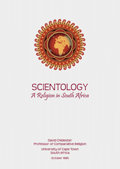In western discourse, the term “religion” has always been problematic. Its ancient Latin root, religio, designated an authentic way of acting—carefully, faithfully, and with scrupulous attention to detail. That authentic way of acting, however, was defined by its opposite, superstitio, a kind of conduct motivated by ignorance, fear, and fraud. As the linguist Emile Benveniste observed, the “notion of ‘religion’ requires, so to speak, by opposition, that of ‘superstition.’ ”3 Inevitably, the distinction between religion and superstition, the authentic and the fraudulent, the familiar and the strange, collapses into a basic opposition between “us” and “them.” In that opposition, authentic religion is claimed for “us,” while beliefs and practices based on superstitious ignorance, fear, and fraud are attributed to “them.”
In southern Africa, this conceptual opposition between religion and superstition has had a long history in European reports about indigenous African beliefs and practices. Throughout the nineteenth century, European observers refused to recognize that those forms of African religious life should count as “religion.” For example, at the beginning of the nineteenth century, J. T. van der Kemp, the first missionary of the London Missionary Society in southern Africa, demonstrated this denial of African religion. Referring to the people of the eastern Cape, van der Kemp stated: “If by religion we understand reverence of God, or the external action by which that reverence is expressed: I never could perceive that they had any religion, nor any idea of the existence of a God.”4 Clearly, van der Kemp denied the fact that the people of the eastern Cape had a genuine “religion.” Instead, van der Kemp insisted, Africans suffered under the ignorance, fear, and fraud of “superstition.”
This refusal to recognize African beliefs and practices persisted into the twentieth century. In the 1920s, for example, the Afrikaner anthropologist, W. M. Eiselen, who would serve in the Bantu Affairs Administration of H. F. Verwoerd during the implementation of “Grand Apartheid” in the 1950s, argued that Africans had no indigenous religion. The term, godsdiens (religion), Eiselen insisted, should be reserved only for what he called “an elevated culture.” Lacking such a culture, according to Eiselen, Africans might have geloofsvorme (forms or patterns of belief) but they have no godsdiens.5 In this formula, therefore, Africans in southern Africa continued to suffer under the categorical denial of their indigenous religious heritage.
The term “religions” has been just as problematic. In the English language, the first recorded use of the plural term, “religions,” is found in 1593 in the work of the Protestant theologian Richard Hooker. Unlike contemporary usage, Hooker used the term “religions” to distinguish between two religions: Protestant and Roman Catholic.6 Obviously, Hooker saw two religions—Protestant and Catholic—where subsequent thinkers have often seen one, Christianity. During the eighteenth century, European thinking about religion divided the world into four religions, Christianity, Judaism, Islam, and Paganism, with the latter sometimes further divided into ancient, modern, and “diabolical” heathenism.7 By 1870, when F. Max Müller delivered his introductory lectures on comparative religion, the number of major religions had expanded to eight—Christianity, Judaism, Islam, Hinduism, Buddhism, Zoroastrianism, Confucianism, and Taoism—with the significant remainder, however, of what Max Müller called indigenous “religions without books.”8 Originally used to define Christian divisions, therefore, the term, “religions” was increasingly employed in efforts to make sense out of a world of religious diversity.9
In the twentieth century, the terms “religion” and “religions” have continued to be entangled in religious conflict. In response to the emergence of “new religious movements” in the 1960s and 1970s, for example, anti-cult propaganda denied the religious status of these movements by labelling them as entrepreneurial businesses, as subversive political organisations, or as brainwashing “cults.” Anti-cult polemic along these lines even seemed to influence the academic analysis of new religions.10
Although it was informed to a certain extent by anti-cult propaganda, the South African Commission of Inquiry that tried to deny the religious status of Scientology in its 1972 report seemed more concerned with reinforcing certain Christian assumptions about what ought to count as legitimate religion in South Africa. According to the commission, the Church of Scientology was not a religion because it did not observe the proper worship of a personal God. “Although Scientology professes to recognize a Supreme Being,” the commission asserted, “it never mentions it as a controlling power or a personal God entitled to obedience and worship.”11 Recalling the Christian missionary’s nineteenth-century denial of African religion, this denial of religious status to Scientology was based upon a specific Christian assumption about the proper form of worship that is supposedly necessary for beliefs and practices to count as authentic religion.
In a detailed rebuttal published in 1975, the distinguished South African Professor of Science of Religion, G. C. Oosthuizen, wryly observed that Scientologists could have gained recognition as a religion by the commission more easily “if they bowed before a holy cow or a monkey god or an elephant god or a snake or a frog.”12
Since a religious way of life can be regarded as a way of being human, this denial of the religiosity of others has also been a denial of the full humanity of other human beings. The question of the definition of religion, therefore, is not merely an academic issue. It is as basic as the question: What counts as a human being?





























